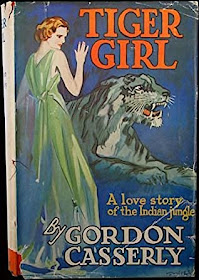- Vampiric gray-furred tiger
- Demonic female phantoms
- Reanimated corpses
- Astral projection
- Telekinesis
- Death by mind control
- Cult that performs human sacrifice
Alan Stuart is our hero, Margery Webb our plucky heroine, and Morton, Stuart's rival and the novel's human antagonist. When a a grey skinned tiger invades the Indian tea plantation owned by Margery's father Stuart turns hunter determined to track down the man-killer. He is warned by the superstitious locals that this will be no easy task for the tiger he is looking for is not an animal but a demon. Legend has it the shaitan kills only women and drains their bodies of blood. Bullets do not seem to harm this predator as Stuart soon finds out in his several battles with the phantom beast.
Meanwhile Morton plots revenge after he is spurned by Margery who he was hoping to marry. Morton allies himself with a powerful yogi who practices black magic and has paranormal skills including astral projection and the ability to revive corpses. Stuart must also contend with a mad elephant on the rampage and a bizarre religious cult that worships Kali for whom the tiger acts as a sort of human sacrifice delivery service.
A scene in which a minor character who, while looking for the rogue elephant hides himself high in a tree, witnesses the cult's ritual ceremony is one of the most gruesome in the book. But the climax of the book surpasses the cult sequence with genuine horror and follows with several scenes of more mystery and supernatural incidents. The action keeps building to an unnerving finale with a completely unexpected twist similar to something one might encounter in a murder mystery.
Tiger Girl has been one of the most elusive supernatural thrillers for decades having been out of print for over seventy years. Vintage copies are difficult to track down or absurdly priced when they ever so rarely turn up for sale. Thanks to Bruin Asylum and the efforts of some savvy collectors of supernatural fiction there is a new and affordable edition of this minor classic. Bruin Asylum's reissue has a brief but detailed biography of Gordon Casserly, highlighting his military service and life in India, as well as discussing his handful of adventure and supernatural novels. The new edition ends with an appendix consisting of an engrossing chapter from Occult Science in India and Among the Ancients (1875) by Louis Jacolliot, a non-fiction work briefly mentioned in the novel's story. His writing is just as evocative, fascinating and thrilling as Casserly's fictional story.
I urge fans of forgotten supernatural and horror novels to buy a copy of this formerly out of print minor masterpiece. This attractively produced volume proves that it really was worth the long wait to have a new copy at a very affordable price.


The book "Occult Science in India and Among the Ancients" by Louis Jacolliot is available free at the Internet Archive
ReplyDeleteWill wonders never cease! And it's no surprise that there are hundreds of POD reprints, too, most likely made from that free copy.
DeleteSounds terrific. Consider it ordered.
ReplyDeleteYou will not be disappointed. Takes a while to get going but by Chapter 4 "A Night of Horror" it never lets down in action and high intensity weirdness. This book is the only one that matches one of my guilty pleasures -- The Devil of Pei Ling, (1927) -- for ultra horror and abundance of arcane supernatural legends. Tiger Girl would've made a helluva movie back in the days when Universal was churning out classic horror cinema.
DeleteFascinating -- proves you really can't judge a book by its cover.
DeleteThe Britishers were really interested in the Cult of Kali, yogic powers, and other paranormal stuff prevalent in India. If nothing else, it gave them great material for plotting stories:) It is not a novel that I would normally search for but your enthusiasm for it makes me want to read this. Thanks for highlighting it.
ReplyDeleteThe Indian characters are not disparaged which made me happy. In fact, many of them are heroes, and one is presented like a superhero -- abnormally strong, excessive bravado, impulsive and brash, a borderline psychopath in today's estimation. But he's one of the best of the minor characters in the book. I should also note that he's also a Pathan who are always depicted as superhuman warriors, übermacho and fierce, in this period genre fiction. The true villain is a loathsome Colonial British man who exploits and manipulates the locals. He manipulates the yogi to be come his ally through pretense and deceit. Casserly definitely has some views on the bigots and the blackguards who took advantage of their supposedly superior place in the world. As someone from India I'd be interested in hearing your views on this book.
DeleteJohn, I hope that's not a spoiler.
ReplyDeleteThe Pathan, of course, has been celebrated through the centuries for his bravery and chivalry. I think Kipling's The Ballad of East and West did a lot to cement his position as a strong man almost at par with the White man. Good to hear that the Indians are not disparged, that makes me more keen to read it.